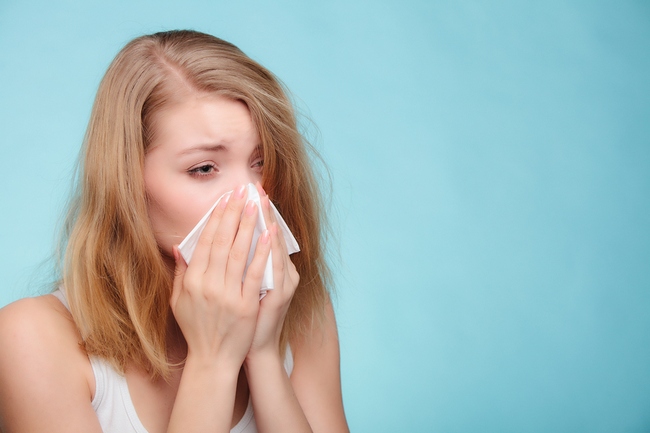- Make It Yourself Lavender Heart-Shaped Bath Bombs!
- 20 Things You Never Knew About “Down There”
- 12 Best Foods For Those Suffering From Arthritis Pain
- 12 Personal Hygiene Mistakes Almost Everyone Makes (Mom Never Told You About #4!)
- 15 Medicinal Plants And Herbs From The Cherokee People
- 12 Mind-Blowing Benefits Of Drinking Coconut Water During Pregnancy
- 12 Outstanding Winter Foods That Won’t Fatten You Up Like A Christmas Turkey
Cold, Flu Or Allergy: How To Tell
Though a cold, the flu, and allergies all affect your respiratory system and may make it harder to breathe, they do have specific symptoms which can help you treat them individually.
The common cold can be caused by a number of viruses, and brings on a cough, sore throat, runny nose, and congestion. A cold may last in its severity for just 2-3 days, or it could drag on a week or longer. If you are truly dealing with a cold virus and not allergies, symptoms should lessen after a week. You could also feel fatigue.
The flu is a specific virus, and generally causes the same symptoms, but a whole lot worse. The flu may also bring a high fever, while this is less likely from the common cold, and last at least 3-4 days in its severity.
Allergies produce similar symptoms – congestion, cough, runny nose, and sore throat. Other symptoms of allergies include a rash, a consistent runny nose without yellow or green mucus, and headache or fatigue. Allergies can be from external allergens, such as pet dander, topical irritants, such as a chemical touching the skin. Internal allergens, such as peanut or dairy could also be the problem. A vast majority of allergies are actually caused by foods we commonly eat which we are sensitive to, the most common being dairy and gluten. If you have ongoing allergy symptoms, try cutting out one of these two common triggers for 4-6 weeks to see if your symptoms improve.
Natural Treatments
Natural Cold Treatments
For a sore throat, purchase (or make your own) slippery elm and licorice lozenges. These take the bite off of a sore throat.
You can also gargle, which is an age old throat treatment. Try gargling with ½ teaspoon of apple cider vinegar, hydrogen peroxide, or salt in filtered water once or twice per day.
To ease nasal congestion, use a nasal rinse or neti pot. Be sure to follow the instructions and blow all mucus out whenever it accumulates in the nose.
With a cough, you also want to be sure you are coughing up and out and mucus which is in your lungs. You will find cough expectorants of sambucus and honey in your average grocery stores these days, but syrups from wild cherry bark are also wonderful expectorants.
Natural Flu Treatments
Like the cold, you want to at the cough, congestion, runny nose, and sore throat the same. You may also be dealing with a fever with the flu, so use a natural fever treatment to make yourself more comfortable and let the fever fight the pathogens in your body. Loading up on antiviral herbs such as echinacea, elderberry, and astragalus can also speed recovery time.
Natural Fever Treatments
If your fever is low, you want to keep it going. Lay in bed with a few blankets, take a warm (not hot) bath, and stay warm. Don’t overheat, but don’t purposely allow yourself to become cold.
If your fever is higher, place room temperature damp cloths on your calves, which can also have some drops of lemon juice or lemon essential oil. A drop of lavender essential oil on the forehead may also help relieve some symptoms and provide some rest. Supplementing probiotics may help battle the virus in your immune system, which is mostly located in your gut. However, rest is the most important during this time. So be sure to cancel all your appointments and get loads of it.
You don’t want to actually bring down a fever, as a fever heats up your body to kill bacteria and viruses. Taking over the counter fever reducers will only prolong your illness by letting the virus or bacteria survive longer, so the key is to make yourself as comfortable as possible and to let the fever do its job.
Natural Allergy Treatments
Use the above methods to treat symptoms, and consider cutting out common allergens or doing an allergy test to determine what you’re allergic to. Many swear by incorporating local, raw honey into your diet (or bee pollen), which will acclimate you to all the plants in your area. Others have luck with apple cider vinegar (drink 1 teaspoon in 1 cup of water in the mornings), nettle, eucalyptus and frankincense oil, or adding probiotics.
Continue to Page 2
How to Prevent Cold, Flu and Allergies
Though you can’t prevent illness all the time, you can boost your immune system to fight against foreign invaders and germs you come into contact with.
The cold and flu viruses aren’t totally avoidable, but you can strengthen your immune system during the colder months to lessen the likelihood of coming down with a virus or lessen its severity.
- Take an antiviral capsule or tea daily during the colder months, or when exposed to illness, such as echinacea, elderberry, or astragalus.
- Take probiotics with high bacteria counts to build up a healthy gut and digestion.
- Consume plenty of water, get at least 8 hours of sleep per night, and exercise regularly.
- Limit processed foods especially pasteurized dairy and grains with gluten.
- Consume bone broth regularly for mineral content and gut health.
- Consider taking a multivitamin supplement throughout the “sick” months.
There’s a lot of debate around how allergies form – are they the cause of too much or too little contact with a substance? What we do know is that allergies are the body’s immune system attacking a food or particle it deems as a foreign invader. This could happen when a substance is combined with a real pathogen, such as in the case of vaccines. A number of researchers have found that the peanut oil in vaccines is bound with the virus in the particular vaccine, and the body recognizes the particle, in this case peanut oil, as a pathogen along with the virus creating an immune reaction to that substance in the future. Supplementing raw, local honey, probiotics, building gut health, and eating a whole food diet can help limit allergic responses for most.
References:


































